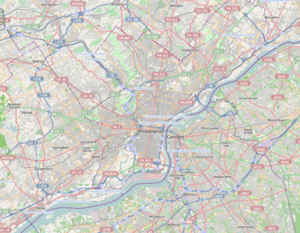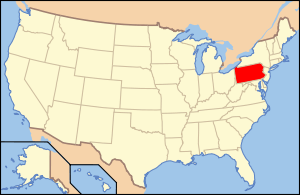Racquet Club of Philadelphia
|
Philadelphia Racquet Club | |
|
The Philadelphia Racquet Club in 2010 | |
   | |
| Location |
213-225 S. 16th St. Philadelphia, Pennsylvania |
|---|---|
| Coordinates | 39°56′55.9″N 75°10′4.74″W / 39.948861°N 75.1679833°WCoordinates: 39°56′55.9″N 75°10′4.74″W / 39.948861°N 75.1679833°W |
| Built | 1906 |
| Architect | Horace Trumbauer |
| Architectural style | Colonial Revival, Other |
| NRHP Reference # | 79002326 [1] |
| Added to NRHP | August 1, 1979 |
The Racquet Club of Philadelphia (RCOP) is a private social club and athletic club in Philadelphia, Pennsylvania. It has facilities for squash, real tennis, and racquets.
Established in 1889, the club started its life in a modest facility at 923 Walnut Street. Under the leadership of George D. Widener, the current 16th Street Clubhouse was built by noted architect Horace Trumbauer. Historian Nathaniel Burt described the new 1907 Clubhouse as "by far the best appointed...of all Philadelphia clubs."[2] The clubhouse is one of the first reinforced concrete structures designed in Philadelphia, and also includes the world's first above grade swimming pool, designed by the noted bridge builders Roebling Construction Company. The building's red-brick, Georgian design, is evocative of historic Philadelphia, and the Clubhouse was placed on the National Register of Historic Places in 1979.
The club was the site of the invention of squash doubles by Frederich C. Tompkins. The new building had a space that was too large for a standard squash court but too small for further locker facilities and Tomkins recommended that it be used for squash doubles.[3][4]
The Racquet Club's athletic facilities include 3 international squash singles courts, 1 squash doubles court, a real tennis court, a racquets court, and a fitness facility. The club also has overnight rooms for the use of members and sponsored guests, as well as a bar and serves lunch daily. The club is open to members 365 days a year. Located on 16th Street between Walnut and Locust, it is in the heart of Philadelphia's Rittenhouse Square area.
The club has hosted several international real tennis, racquets, and doubles squash tournaments and championships. It was once home to multiple national amateur U.S. champion Morris Clothier and national and world champion Jay Gould II.
The U.S. Squash Hall of Fame was briefly at the club until moving to Yale University.[5]
See also
References
- ↑ National Park Service (2007-01-23). "National Register Information System". National Register of Historic Places. National Park Service.
- ↑ Nathaniel Burt, Perennial Philadelphians: The Anatomy of an American Aristocracy, Little, Brown and Company, 1963 (reprinted 1999), p. 268
- ↑ History of the Sport of Doubles Squash Canada
- ↑ Origin of Doubles Part 1 squashtalk.com
- ↑ "Hall of Fame & Museum". U.S. Squash. Retrieved 2 March 2010.

